TIGERBELLES REMEMBER THE














7



















‘Velvet Buzzsaw’ is a supernatural satire, stabbing at the underbelly of the art


Contributor Board
Cathy Jennings, Chair Tom Wills, Bruce Doeg, Demetria Kalodimos, Ann Bourland
Linda Bailey
• Amanda Haggard • Tom Wills • Ridley Wills II • Joe Nolan • Vicky B. • Harold B. • Jen A. • Michael “Smiley” G. • William B. • Aaron S. • Reginald Black
• Olivia Richter • Lauren Gerson • Rodney Choice • Mr. Mysterio


Cathy Jennings • Tom Wills • Joe First
• Andy Shapiro • Michael Reilly • Ann Bourland • Patti George • Linda Miller • Deborah Narrigan • John Jennings • Barbara Womack • Colleen Kelly • Janet Kerwood • Logan Ebel • Christing Doeg • Laura Birdsall
• Nancy Kirkland • Mary Smith • Andrew Smith • Ellen Fletcher • Anna Katherine Hollingsworth • Michael Chavarria
Will Connelly, Tasha F. Lemley, Steven Samra, and Tom WIlls
Editorials and features in The Contributor are the perspectives of the authors.

Submissions of news, opinion, fiction, art and poetry are welcomed. The Contributor reserves the right to edit any submissions. The Contributor cannot and will not endorse any political candidate.

Submissions may be emailed to: editorial@thecontributor.org
Requests to volunteer, donate, or purchase subscriptions can be emailed to: info@thecontributor.org Please email advertising requests to: advertising@thecontributor.org





Mailng Address
The Contributor P.O. Box 332023, Nashville, TN 37203
Editor’s Office: 615.499.6826 Vendor Office: 615.829.6829

Proud Member of:




Printed at:
Follow The Contributor:
Copyright © 2018 The Contributor, Inc. All rights reserved.

world.Civil Rights icons Julian Bond and John Lewis had Nashville ties.in this issue's 'History Corner'.
The longest-serving black, woman in the House of Representatives talks Civil Rights, homelessness.
Honoring the female track stars and their coach who broke the so-called color barrier at the 1960 Olympics.Cathy Jennings Executive Director Andrew Krinks Editor Emeritus Contributor Co-Founders



 BY TOM WILLS, CO-FOUNDER
BY TOM WILLS, CO-FOUNDER
The paper you just paid for was bought by someone else first, otherwise it wouldn’t exist. That’s how The Contributor works. A vendor who experienced homelessness paid 50 cents for this paper and then sold it to you. By buying it and taking it with you, you’ve just encouraged that vendor to buy another. BOOM! That’s the solution. Now keep reading. This paper has something to say to you.
Street papers provide income for the homeless and initiate a conversation about homelessness and poverty. In 2007, The Contributor founders met at the Nashville Public Library downtown to form one. In a strike of lightning we named it The Contributor to infer that our vendors were “contributors to society,” while their customers could contribute to their work. But, thunder from lighting is always delayed …
It took three years, but Nashville embraced us like no other city in the world. The Contributor became the largest selling street paper per-capita on the globe. And today 50 percent of our six months or longer tenured vendors have found housing. BOOM! The thunder has struck.
The Contributor is a different kind of nonprofit social enterprise. We don’t serve meals or provide emergency shelter. We don’t hire people in poverty to create products or provide a service. Rather, we sell newspapers to homeless people who work for themselves. We train them to sell those papers to you, keep the money they earn, and buy more when they need to replace their stock.
Our biggest fans don’t always get this. Like lightning without the thunder, they see the humanity of the vendor but misunderstand the model. Case in point: In 2013 during a funding crunch, a representative of one of Nashville’s biggest foundations exclaimed, “I’m such a big fan that I never take the paper!” We responded, “Well, that’s why we are in a funding crunch.”
BOOM! Thunder was heard. Taking the paper makes our model work — not taking it breaks it.
And selling the paper twice doesn’t just fund the paper, it funds housing and change. BOOM! Our vendors report their sales to qualify for subsidized housing and even for standard housing deposits and mortgages. They don’t consider your buying the paper a “donation.” It is a sale. When they sell out, they buy more and build the paper trail of a profitable business. Until making these sales, many of our vendors had never experienced the satisfaction of seeing their investment pay off. And when it does, it liberates! They have become “contributors” to their own destiny. And Nashville has become a city of lightning and thunder. BOOM!
Now that you are a SUPPORTER , become an ADVOCATE or a MULTIPLIER
You are already a SUPPORTER because you know that taking the paper makes the model work. You bought the paper and you are reading it. Now your vendor is one copy closer to selling out, which is exciting! Now you can become an ADVOCATE when you introduce your friends to your favorite vendor, follow us and share our content on social media, contact us when you witness a vendor in distress or acting out of character, or explain why others should pick up a copy and always take the paper when they support a vendor. And, you can become a MULTIPLIER when you advocate for us AND directly donate to us or become an advertiser or sponsor of The Contributor. Our income stream is made of 50-cent- at-a-time purchases made from our vendors, matched by contributions, ad sales and sponsorships from multipliers like you. Because our vendors are business owners, your donations are seed-money investments in their businesses and multiply in their pockets. Every donated dollar multiplies four-to-seven times as profits in the pockets of our vendors. Thanks for contributing.
El periódico que usted acaba de pagar fue primeramente comprado por alguien mas, de otra manera no existiría. Así es como funciona The Contributor. Un vendedor que está sin hogar pagó 50 centavos por este periódico y después se lo vendió a usted. Al comprarlo y llevarlo con usted, usted animo a este vendedor a comprar otro. BOOM! Esa es la solución. Ahora continúe leyendo. Este periódico tiene algo que decirle. Los periódicos vendidos en la calle proveen ingresos para las personas sin hogar e inicia una conversación sobre lo que es la falta de vivienda y la pobreza. En el 2007, los fundadores de The Contributor se reunieron en una librería pública en Nashville para formar uno. Y como golpe de un rayo, le llamamos The Contributor para dar a entender que nuestros vendedores eran “contribuidores para la sociedad,” mientras que los consumidores podrían contribuir a su trabajo. Pero, el trueno siempre tarda más que el rayo. Nos llevó tres años, pero Nashville nos acogió como ninguna otra ciudad en el mundo. The Contributor se volvió uno de los periódicos de calle más vendido en el globo. Y hoy el 50 por ciento de nuestros seis meses o más de nuestros vendedores titulares han encontrado casa. BOOM! Ha llegado el trueno. The Contributor es una empresa social sin fines de lucro muy diferente. Nosotros no servimos comida or proveemos alojo de emergencia. No contratamos gente en pobreza para crear productos or proveer un servicio. En vez, nosotros vendemos periódicos a las personas sin hogar para que ellos trabajen por ellos mismos. Nosotros los entrenamos como vendedores, ellos se quedan el dinero que se ganan, y ellos pueden comprar más cuando necesiten reabastecer su inventario. Nuestros mas grandes aficionados no entienden esto. Como un rayo sin trueno, ellos ven la humanidad de el vendedor pero no comprenden el modelo. Un ejemplo: En el 2013 durante un evento de recaudación de fondos, uno de los representantes de una de las fundaciones más grandes de Nashville, exclamó: “Soy un gran aficionado, y es por eso que nunca me llevo el periódico.” Al cual nosotros respondimos: “Y es por esa razón por la cual estamos recaudando fondos.” BOOM! Y se escuchó el trueno! El pagar por el periódico y llevárselo hace que nuestro sistema funcione, el no llevarse el periódico rompe nuestro sistema. Y el vender el papel dos veces no da fondos para el periódico, pero da fondos para casas y causa cambio. BOOM! Nuestros vendedores reportan sus ventas para calificar para alojamiento subvencionado y hasta para una casa regular, depósitos e hipotecas. Ellos no consideran el que usted compre el periódico como una “contribución” pero más lo consideran como una venta. Cuando se les acaba, ellos compran mas y asi logran establecer un negocio rentable. Hasta que lograron hacer estas ventas, muchos de nuestros vendedores nunca habían experimentado el placer de ver una inversión generar ganancias. Y cuando logran hacer esto, da un sentido de Liberación! Ellos se han vuelto contribuidores de su propio destino, y Nashville la ciudad de el trueno y el rayo. BOOM! Ahora que te has vuelto nuestro SEGUIDOR, vuelve te en un ABOGADO o un MULTIPLICADOR. Ya eres nuestro SEGUIDOR, porque sabes que al llevarte este periódico sabes que esto hace que nuestro modelo funcione. Compraste el papel y lo estas leyendo. Ahora nuestro vendedor está a una copia más cerca de venderlos todos. Que emoción!
BY JOHN JENNINGSAhora que te has vuelto nuestro ABOGADO cuando presentes a tus amigos a tu vendedor favorito, siguenos y comparte nuestro contenido en social media, contactanos cuando seas testigo de un vendedor actuando de manera extraña o fuera de carácter. O explicale a tus amigos porque ellos deben de llevarse el periódico cuando ayuden a un vendedor.
Te puedes volver un MULTIPLICADOR cuando abogues por nosotros, Y directamente dones a nosotros o te vuelvas un anunciador o patrocinador de The Contributor. Nuestra fuente de ingresos consiste en ventas de 50 centavos hechas por nuestros vendedores, igualadas por contribuciones, venta de anuncios, y patrocinios de multiplicadores como usted. Porque nuestros vendedores son dueños de negocios, las donaciones que den son dinero que es invertido y multiplicado en sus bolsas. Cada dólar donado se multiplica de cuatro a siete veces en la bolsa de nuestros vendedores.

Gracias por Contribuir.

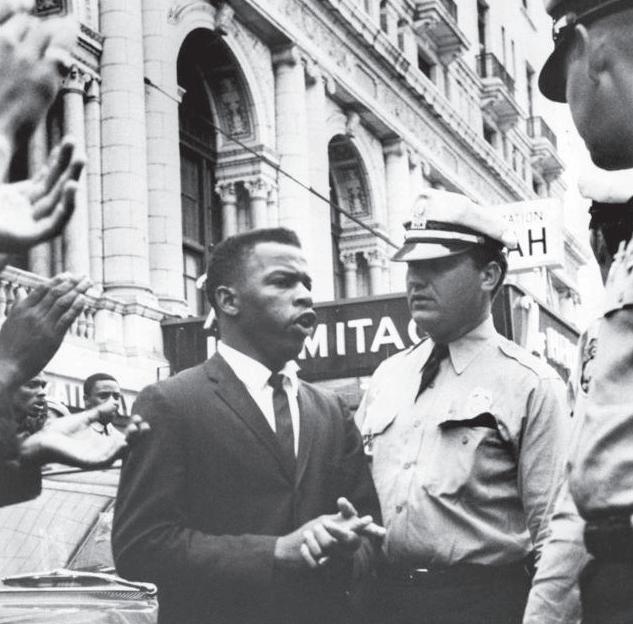
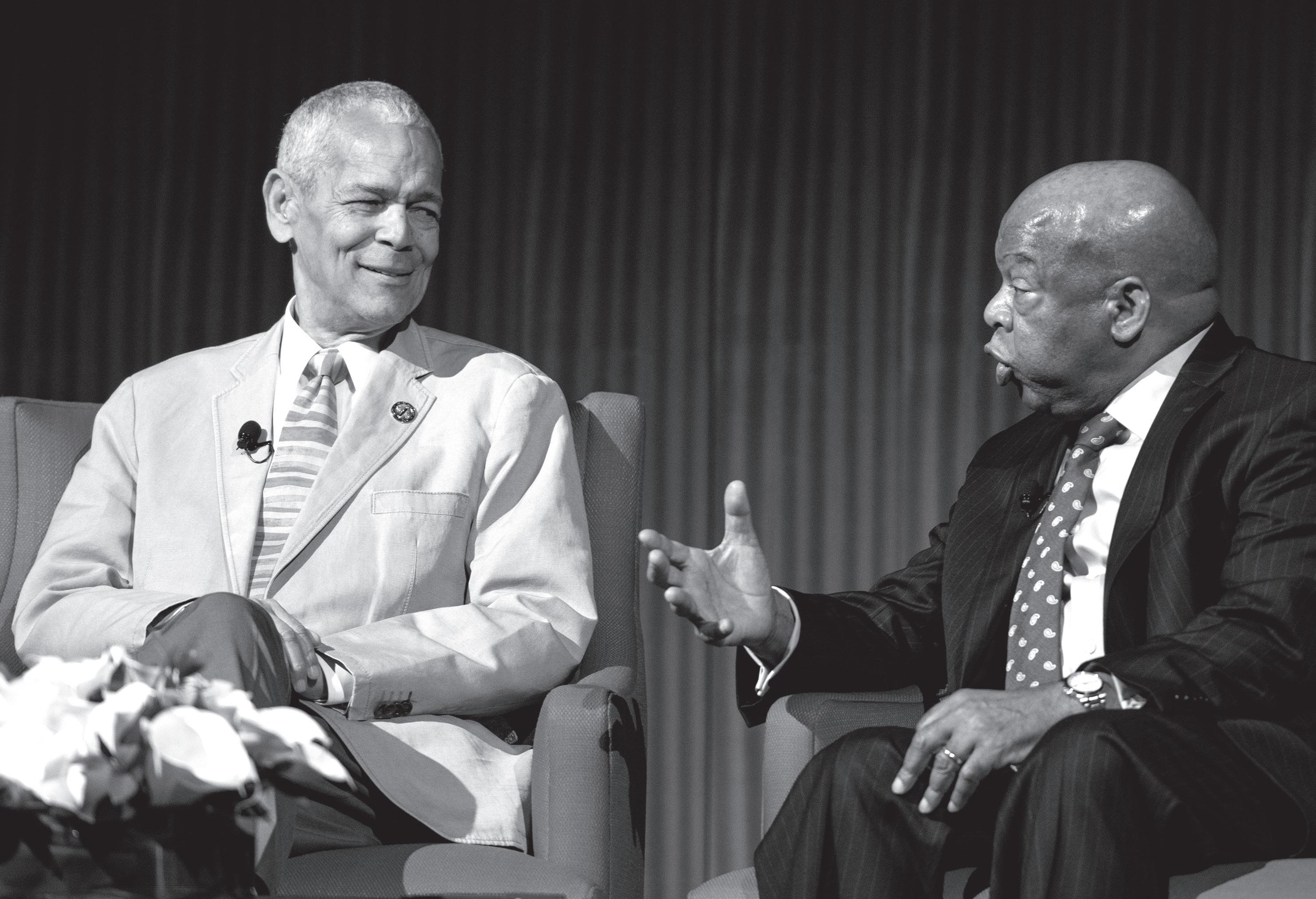 BY RIDLEY WILLS II
BY RIDLEY WILLS II
Julian Bond was born Jan. 14, 1940 in Hubbard Hospital in Nashville, where his grandfather taught at Pearl High School. A great grandfather, Aaron Brown, was, I believe, the son of a white businessman named Louis Lishey, who had a floral business on Lishey Avenue in East Nashville. Aaron Brown lived with the Lisheys, who gave him a greenhouse to start his own nursery business. After his death, Brown, who was considered black, was buried near the Lisheys in the Spring Hill Cemetery.
When Bond’s father, Horace Mann Bond, became President of Lincoln University in Oxford, Pa., the Bond family moved there from Nashville. In Oxford, Julian Bond attended a public school, where he was named the brightest boy in the sixth grade. He then went to the George School outside Philadelphia.
When Horace Bond was named president of Atlanta University, his family moved to Atlanta where Julian attended and graduated from Morehouse College. From 1960 to 1966, he organized and became the communications director of the Student Non-violent Coordinating Committee (SNCC). In that role, he got to know John Lewis, an African American his age, who was also a co-founder of SNCC and a veteran of the Freedom Ride to Alabama and Mississippi where he was injured and jailed. Bond could relate to that as he, between 1960 and 1963, led student protests against segregation in public facilities in Georgia.
Lewis, a native of Troy, Ala., in the “Black Belt”, had seen, when he was six years old, only two white people in his life. In 1963, He was fresh from being one of the “Big Six” leaders of groups who organized the 1963
march on Washington. A graduate of both American Baptist Theological Seminary and Fisk University, Lewis was a leader in the Nashville sit-ins of 1960. He would go on to be one of the great Civil Rights leaders of the late 20th century and early 21st century. Today, he is serving his 17th term in the U.S. House of Representatives from Georgia.
From 1966 to 1975, Julian Bond served in the Georgia House of Representatives. In 1976, he won a seat in the Georgia Senate. He gave this up to run for Congress where his friend from SNCC days, Lewis, defeated him. He also, with Morris Dees, founded the Southern Poverty Law Center in Montgomery, Ala., and was its president from 1971 until 1979. The Southern Poverty Law Center fights hate groups in America.
During the early 1990s, Julian Bond served as visiting professor at Harvard and UVA. From 1998 to 2002 or later, he was chairman of the NAACP. In about 2014, having discovered that Julian Bond was born in Nashville, where his family had lived for at least four generations, I contacted him by e-mail at the University of Virginia, where he was teaching.
When I told him something about his Nashville ties, he quickly responded: “Ridley, you know more about my Nashville ties than I do. Keep me informed if you find out more.”
John Lewis frequently returns to Nashville where he proudly says he got his start in Civil Rights work. He also is proud of having been educated at American Baptist Theological Seminary and Fisk.
VICKY B.
It's hard to express All the despair I feel inside We're not wanted here We're not wanted there
It feels like a blessing But turning into a curse No parking here No parking there
It's hard to blend in Being 31 feet long Can't stay here Can't stay there
We've come so far Can't give up now Possibly here Or possibly there
“Sell it” they say But I wait to hear Sure you can park here Of course you park there
HAROLD B.
Time after time we live like we should our hearts are not bad we simply be good.
Althought they try to separate us we knew they never would becuase of the simple phrase together we stood.
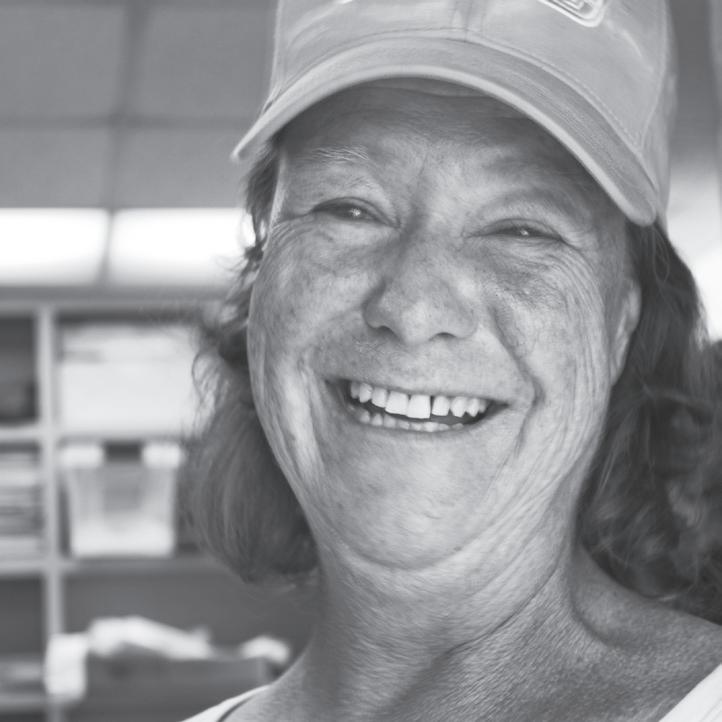
For many years the parking lot of a corporate giant has been known as a place to pull over, park and get some sleep. For people who are homeless and living in their vehicles it's become a safe place to get some sleep for the night without the fear of harassment. Metro Police have even told those sleeping in their vehicles to park there. Over the summer, notes started appearing on trucks, cars, and RVs stating that they had been identified as vehicles that had been there more than 24 hours and had to be moved or be towed. We didn't receive one of these notes, but many who did told me about it and even showed me the letters. These notes also included employees of the store who were sleeping in their cars. Homeless employees that had no place else to go were being told to leave their parking lot — proof that $10 an hour isn't a living wage. Most people work during the daytime, but still don't make enough to afford a place to live or, like us, have rental issues. Cars have become a safe haven to get much needed rest for people who live in them.
At 7:45 p.m on Dec. 21, after making a purchase in the store, I was parked in the back of the lot as usual — not wanting to take up parking spaces in the front. I had been back at the RV for maybe 45 minutes when a rather loud, obnoxious bang on the door rattled the entire RV. An overeager rent-a-cop was on the other side of the door telling me that we had to leave because, “They don't want you here.” We didn't come back to this store for some time and found other places to shop.
overnight I was just eating what I purchased in the store. The security guard said, “Leave now or I'll have you towed.” Angry and upset I left right away.
The store’s corporate policy states, “While we do not offer electrical service or accommodations typically necessary for RV customers, we values RV travelers and considers them among our best customers. Consequently, we do permit RV parking on our store parking lots as we are able. Permission to park is extended by individual store managers, based on availability of parking space and local laws. Please contact management in each store to ensure accommodations before parking your RV.” Of course this goes against what the overeager rent-a-cop said to me. I called the store and spoke to the manager on duty, and the corporate office and complained about the harassment I received.
RV living has certain unwritten rules. When you're in a parking lot you don't take out your leveling jacks so you don’t damages the concrete. You don't run your generator so it's quiet for others to sleep. You don't put your slides out. We pick up after ourselves. It's RV etiquette. The homeless sleeping in their cars aren't singled out because they blend in with other shoppers, but here we are being profiled because of what we drive.
JEN A.
truth
the flag flaps in a cold hard wind mostly cloudy
At 5:15 p.m. on Jan. 7, I decided to give them another try and bought some food eat in the RV. I started eating, took my dog, Faith, outside, and returned to finish eating. At 6:20 p.m., I was disturbed by another obnoxious bang by the same overeager rent-a-cop saying, “There is no overnight parking here. Leave now.” I told him I wasn't parking
Solution: What if local businesses offered overnight parking passes to help people who live in their cars? A simple $5 charge for cars and $10 for RV's. Businesses could make a little pocket change and each driver could register with the store, show their drivers license, and sign a waiver of liability. They'd receive a paper pass dated and put on their dash to show they have permission to stay from 9 p.m. - 7 a.m. The size of the businesses parking lot would dictate how many cars/RVs they would allow. What a great program this could be to help those who are homeless and waiting for housing.



Netflix’ latest original film, Velvet Buzzsaw, reunites actors Jake Gyllenhaal and Rene Russo with writer-director Dan Gilroy – the trifecta last assembled for the dark and brilliant Nightcrawler (2014). Nightcrawler ’s title belies its nocturnal preoccupations, and while both films revel in revealing the dark side of the City of Angels, Velvet Buzzsaw is a bright white cube compared to the murky blue milieu of the previous film.
In Velvet Buzzsaw, Morf Vanderwalt (Gyllenhaal) is a star art critic whose pronouncements on displays of contemporary creativity — an android Uncle Sam in a Lone Ranger mask, an interactive chrome blob — can make or break careers. Of course Morf’s very name speaks to his duplicity which is accompanied by a somewhat slippery grasp of ethics: He treats his writing career like a sacred vocation. He's also a promiscuous bisexual who cheats on his boyfriend with aspiring gallerist Josephina (Zawe Ashton). Josephina works for cutthroat gallery owner Rhodora Haze (Russo). Director Gilroy also wrote this film and Velvet Buzzsaw ’s greatest strength is the playful Robert Altman-esque interplay between this big cast, which also includes Toni Collette as Gretchen, a former museum curator who’s cashing in as a private art advisor, and John Malkovich as Piers, an
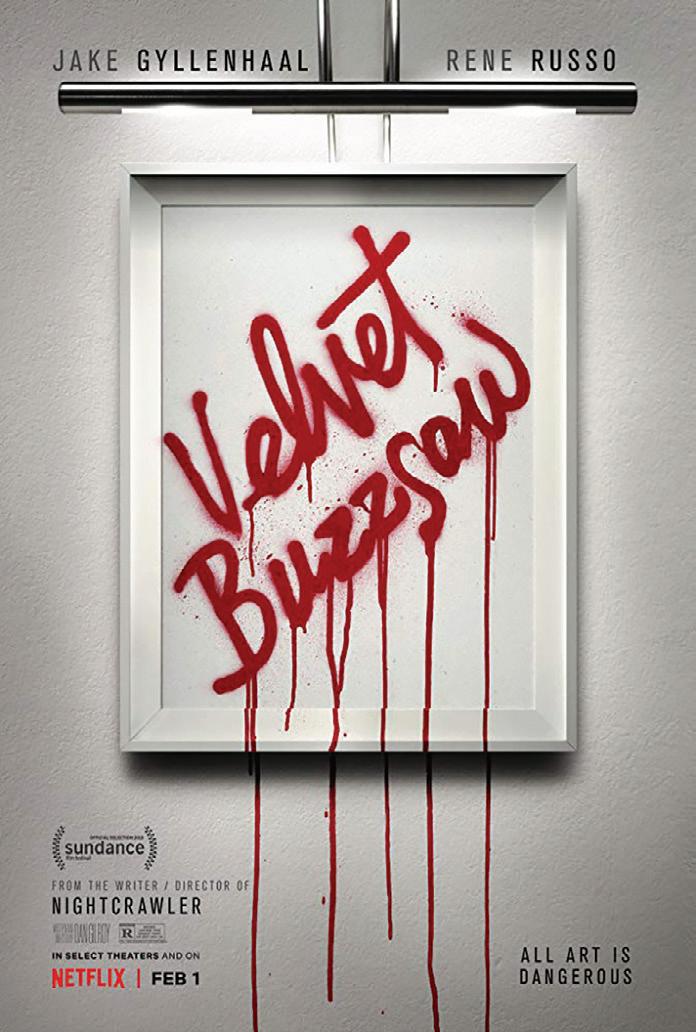

established artist struggling to stay relevant, staring down alcoholism and painter’s block. These characters embody art world archetypes, and if they threaten to become merely cyphers for “art star” and “wealthy collector” it’s all part of the over-the-top fun at play in this satire. Velvet Buzzsaw spotlights the most absurd and unscrupulous aspects of contemporary art culture and then explodes
them in sensational scenarios that tingle with manic glee and often result in gallons of gore.
Gilroy sets his sinister stage at the Art Basel fair in sun-drenched Miami — it’s a great location for all of his key characters to cross paths in the film’s opening scene. But by the time the story switches to Los Angeles those old Nightcrawler vibes start to creep in before Velvet Buzzsaw loses its mind and unravels into a full-on supernatural horror film. The creeps start coming when Josephina discovers a hoard of visionary paintings in the apartment of a dead man named Ventril Dease. It’s slowly revealed that Dease’ backstory includes a career as a janitor and a childhood marred by abuse and institutionalization. I haven’t seen or read many comparisons, but for me this film smartly borrows from the most fun and frightening bits of the Nightmare on Elm Street universe giving us a mutable menace that attacks not when his victims are sleeping, but when they are confronted by art.
If this all sounds almost ridiculous it’s because it mostly is. Velvet Buzzsaw isn’t a comedy, but you can’t help but laugh at its outrageous caricatures of jet set gallery sharks
and culture stars. That said, a little more restraint would’ve made Velvet Buzzsaw cut much deeper. Comedy is built on contradictions and the most over-the-top aspects of Velvet Buzzsaw would’ve come off as extra unhinged if the tone here were flatter and straighter. The problem is that Velvet Buzzsaw always seems too ready to laugh at its own excesses, and it’s this tongue-almost-incheek tone takes the snap out of every slap.
That said, Velvet Buzzsaw ’s talented cast, over-the-top characters, and unexpected genre-jumping make for a fun night at home with a movie. It’s recommended for The Contributor ’s readers because there is a sly bit of class commentary here that finds Los Angeles’ homeless community getting the last of Velvet Buzzsaw ’s laughs, which is way better than being attacked by a painting.
‘VELVET BUZZSAW’ IS A SUPERNATURAL SATIRE, STABBING AT THE UNDERBELLY OF THE ART WORLDBY AMANDA HAGGARD
In 1960, Tennessee State University women’s track coach Ed Temple and a group of female track stars did something nobody had ever done before. They broke the so-called color barrier at the Olympics.
When the team first started competing nationally: “Coach Temple was given $300 and two station wagons and told to go compete against the world,” says Dwight Lewis, a former Tennessean writer and editor and co-author of the book Temple’s Tigerbelles: An Illustrated History Of The Women Who Outran The World. Lewis will discuss Temple’s Tigerbelles: An Illustrated History Of The Women Who Outran The World at Parnassus Books, 3900 Hillsboro Pike, Suite 14, on Feb. 24 at 2 p.m.
In Lewis’ book, he and co-writer former Tennessean writer Susan Thomas take readers on a historical journey, but the book could also be considered great reading for a sports junkie or, because of its illustrations, a book to introduce kids to the Tigerbelles. The illustrations are done by Nashville artist James Threalkill, who’s also done work for Sesame Street, The Jamie Foxx Show and Living Single.
In 1960, the team earned several gold, silver and bronze medals at the Rome Olympic games in Italy. It was the same year the the Civil Rights Act of 1960 was established, creating penalties for attempting to keep people from voting. In Nashville, black college
students were engaging in sit-ins to desegregate lunch counters at Woolworth's, Kress's and McLellan's and the city became the first major city in the country to desegregate public facilities.
“They could win gold medals at the Olympics, on a world stage, and yet come back home and not be able to eat in a restaurant,” says Howard Gentry, the Davidson County Criminal Court Clerk, in a Middle Tennessee State University press release. Gentry, a TSU alumnus, was very close to Temple before Temple’s passing in 2016, and his family has served at Tennessee State University throughout the years.
This past year, Middle Tennessee State University film professor Tom Neff released Mr. Temple and the Tigerbelles, a film honoring the team and their coach. Neff, who created the film with the help of students and faculty from MTSU’s College of Media and Entertainment, is an Academy-award nominated filmmaker and the creator of the Documentary channel. Lewis, who wrote the book about the Tigerbelles, is also featured in the documentary, which took three years to produce.
“The more we got into the story, the more pressure we put on ourselves to tell it in an innovative way,” Neff says.
The Tennessee State Museum at 1000 Rosa L. Parks Blvd., will host a free screening of Mr. Temple and the Tigerbelles on Feb. 16 at 2 p.m.
At the screening, Gentry will join Neff and former Tigerbelle and Olympic Gold Medal winner Chandra Cheeseborough for a discussion. The screening is a partnership with the Tennessee State Museum, MTSU, TSU, The Community Foundation of Middle Tennessee and The African
American Guide to Nashville. The film was included on the 2018 International Documentary Association’s short list of film shorts.
In addition to Cheeseborough, who also became a TSU women’s track coach, Wilma Rudolph was a huge star at the 1960 Olympic Games — taking home three gold medals that year (the first American woman ever to do so) and gaining the title of the fastest woman on earth. Rudolph spent her childhood recovering from polio.
“My doctors told me I would never walk again,” Rudolph once said. “My mother told me I would. I believed my mother.”
After recovering she decided she wanted to become an athlete and defied all odds in pursuing her dream.
Rudolph passed away in 1994, but she once told a newspaper: “I loved the feeling of freedom in running, the fresh air, the feeling that the only person I'm competing with is me.”
Her coach, Temple, was known for his rigorous training regimen — often starting before the sun went up and holding practices several times in one day. In his more than 40 years as a coach, he led his team to win 13 gold, six silver and four bronze medals at the Olympics. Temple also led the team to 34 national titles. And eight of the women he coached are in the National Track and Field Hall of Fame.
Temple was always proud that his athletes all completed their college education — some earning bachelor’s degrees, and several earning masters and doctorates.
“At that time, people weren’t too keen on women participating in sports,” Temple once said. “Everything was geared toward football and basketball at Tennessee State, but the Tigerbelles came along. They worked hard and it paid off.”
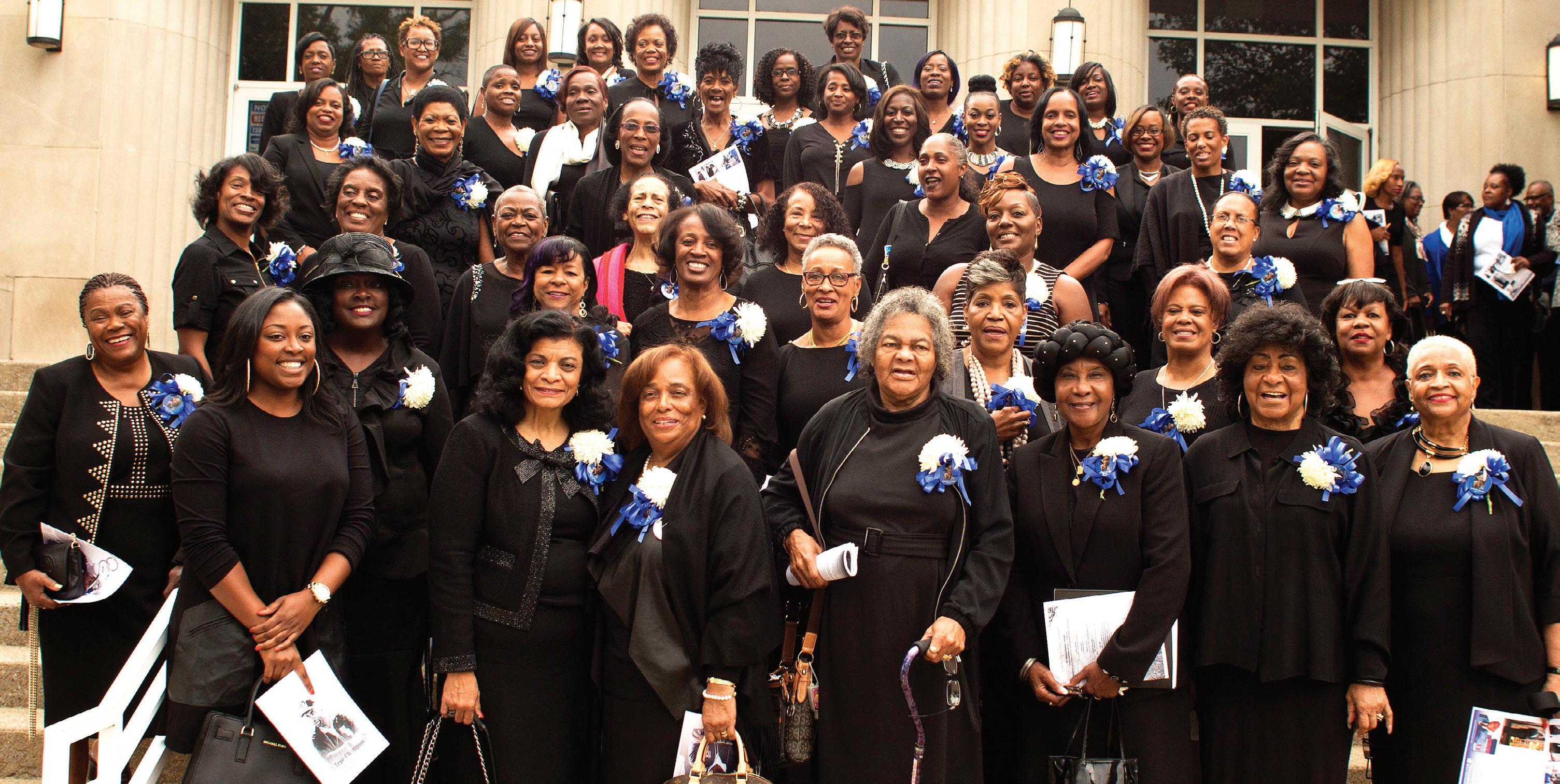
THE TENNESSEE STATE MUSEUM AT 1000 ROSA L. PARKS BLVD., WILL HOST A FREE SCREENING OF MR. TEMPLE AND THE TIGERBELLES ON FEB. 16 AT 2 P.M.
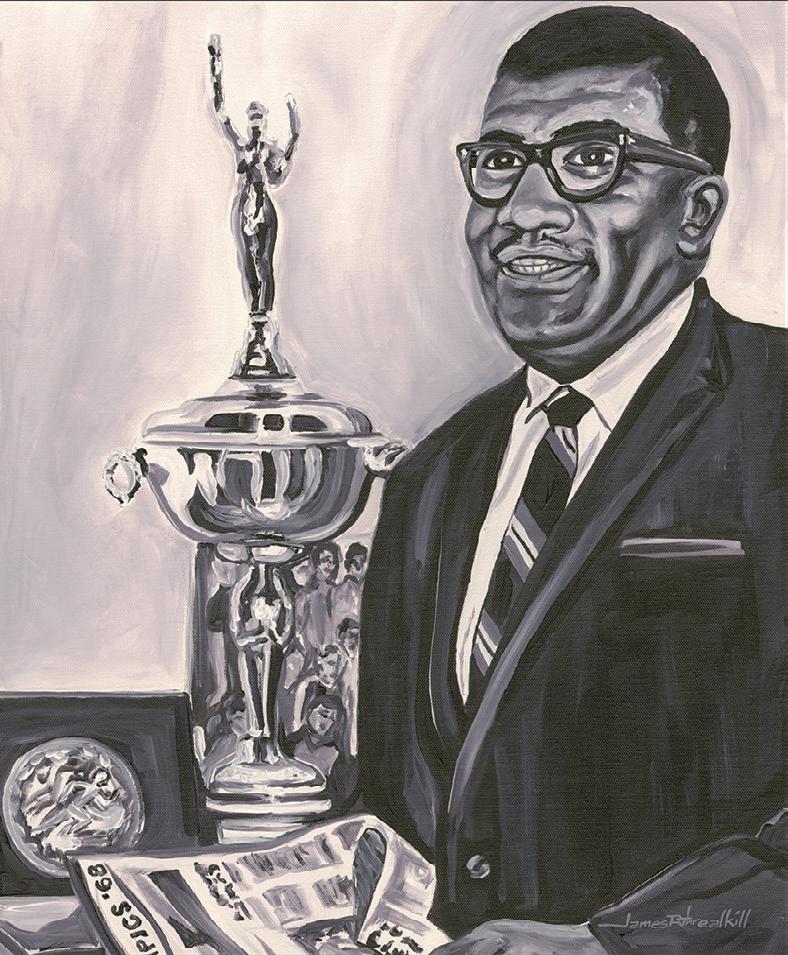
DWIGHT LEWIS WILL DISCUSS TEMPLE’S TIGERBELLES: AN ILLUSTRATED HISTORY OF THE WOMEN WHO OUTRAN THE WORLD AT PARNASSUS BOOKS, 3900 HILLSBORO PIKE, SUITE 14, ON FEB. 24 AT 2 P.M.
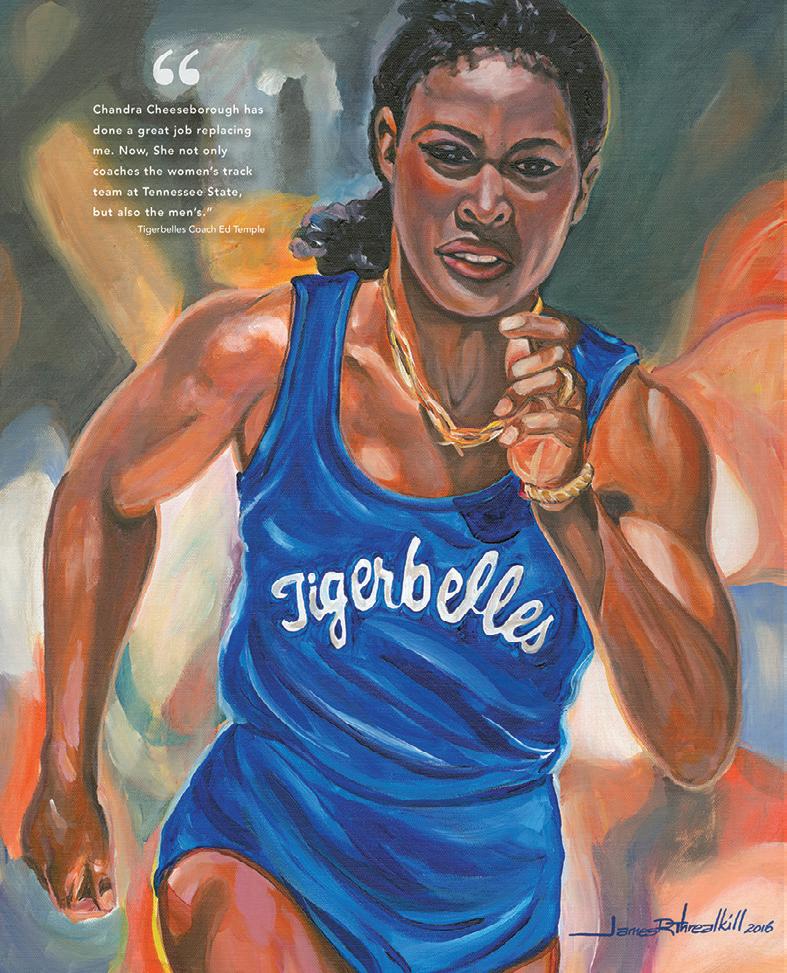
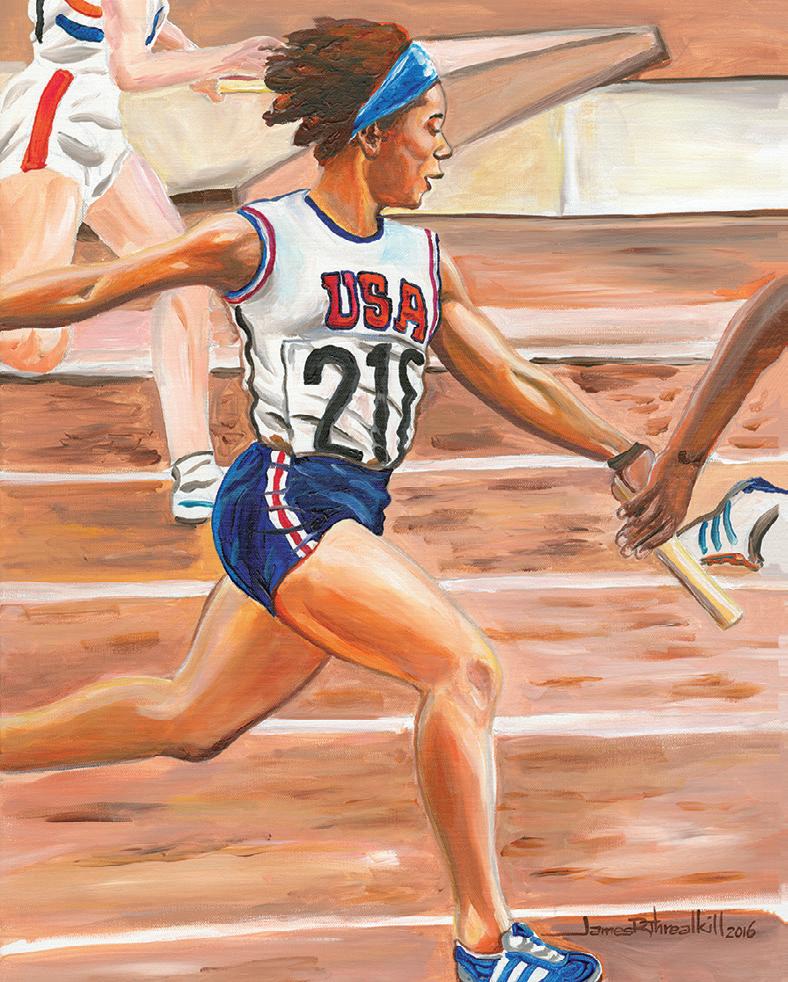
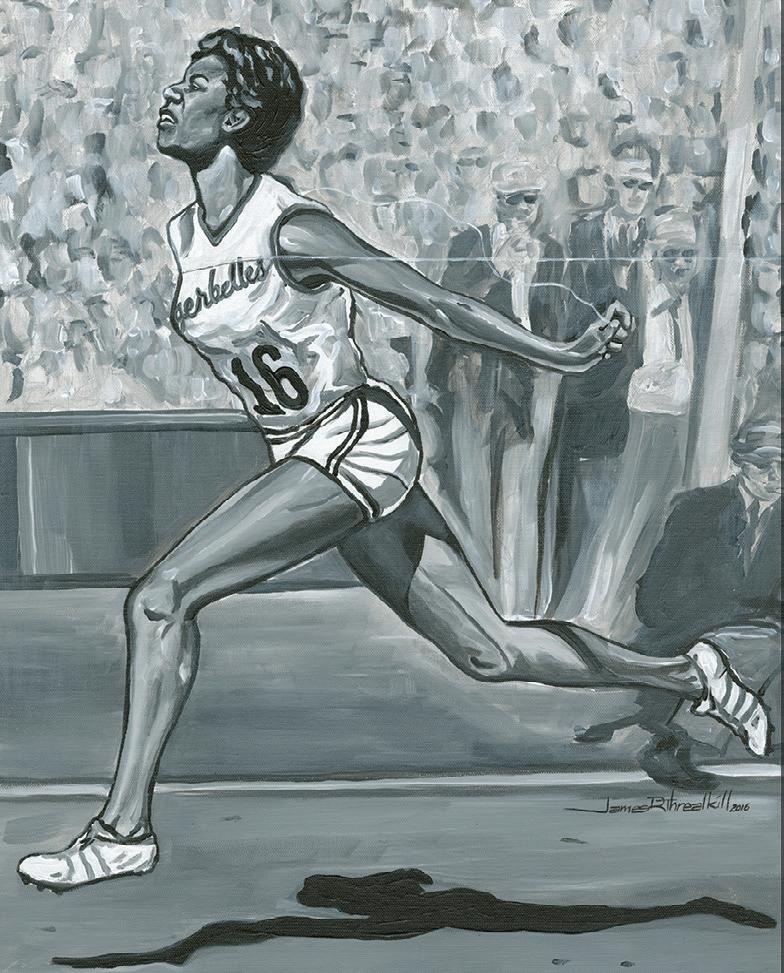
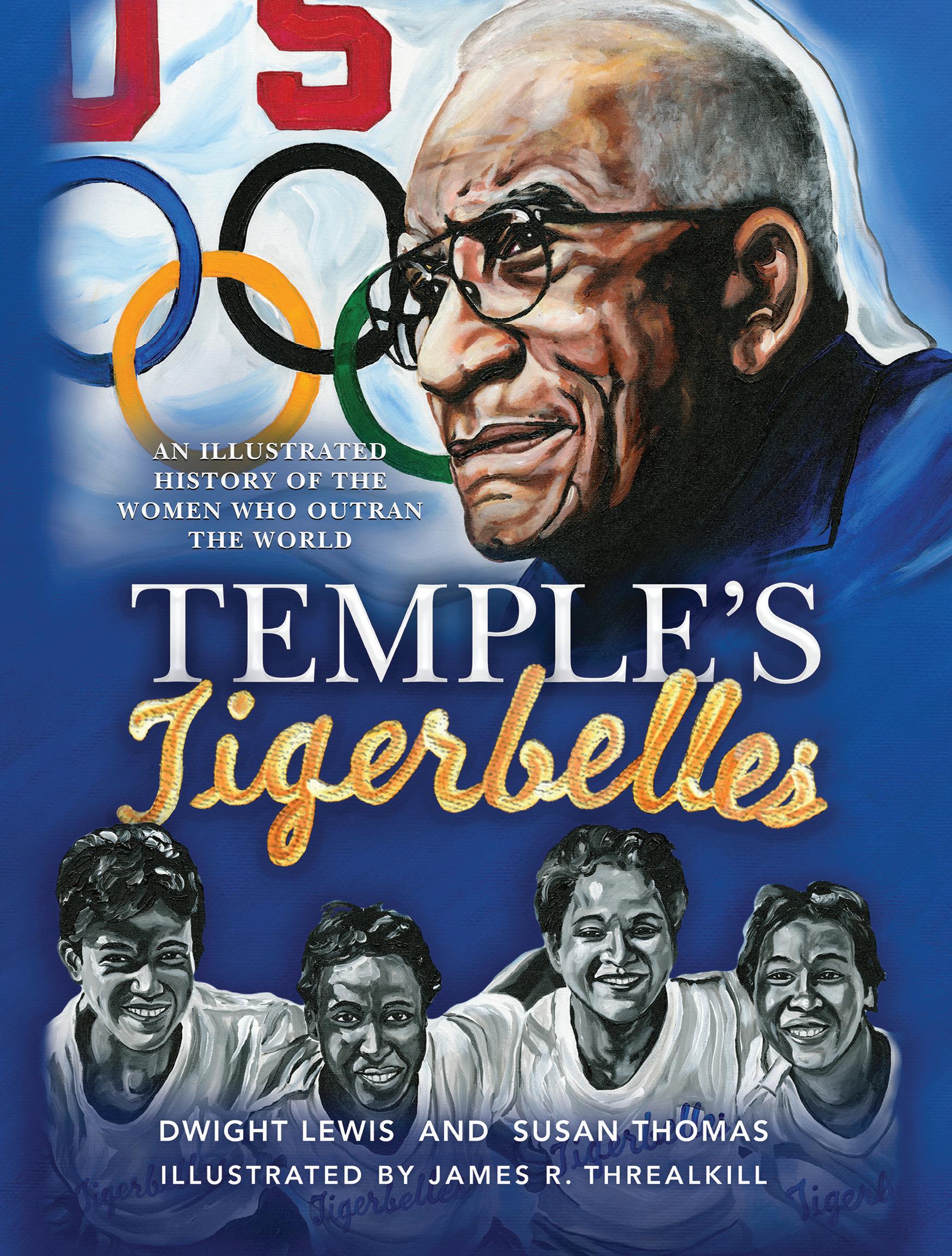

There was nothing left to say
My dreams all flown away On clouds, on a darkened night far, far, from my sight Didn’t know what it was, when we fell in love
Looking down, when I should have been looking above Come’s once in a lifetime Every one will say I gave my hand I gave my heart Came to understand Nothing left to say My dreams, all

I sell newspapers on a street corner in Nashville, Tennessee. It’s an honest living and I’ve met any number of wonderful folks. But some days when my papers aren’t selling, or it’s 100 degrees in the shade, or below freezing with a 30 mile an hour wind whipping at me out of the north, I wish I had chosen a different career path.
Back in the day, I decided that the high medical arts best suited my interests and abilities. I was a very good student. But when, with great enthusiasm, I told the admissions counselor at a highly respected university that I wished to become a doctor; he rolled his eyes, looked at me as though I had two heads, and with a little chuckle said, “I can’t let you into the pre-med program. You’re a girl. Why don’t you try nursing.” That was not the first time I’d been dismissed in such a demeaning manner. And , unfortunately, it would not be the last. And so today, all these years later, I sell newspapers. But, you know, the job suits me. I get to be outside and I get plenty of exercise walking up and down at my spot. Recently I heard a report on the radio that said exercise and fresh air go a long way to reduce the risk of
dementia in older folks like me. As my dear mother always used to say, “You don’t want to lose your marbles.”
And this job gives me the opportunity to meet some truly wonderful people. I appreciate it when folks stop to buy my papers. Their kindness lights a spark in my heart. Even those who don’t buy a paper but take the time to smile and wave—that lifts my spirits too. In short, selling The Contributor makes me happy. I get to earn my way and feel good about selling a quality product.
I would appreciate it if you would take the time to turn to page two of this issue and take note of the names of the people who help turn poverty into promise by producing The Contributor. They volunteer their valuable time and great talents for all of us. The Contributor isn’t made just for those of us who sell it. It’s also for the people who buy and read it. In all ways, The Contributor is the beating heart of compassion in Nashville, Tennessee.
As a group of great Americans always used to say, “Salute!”
I had started to break into cars at the age of five. I would bust out the back little window so that way I could take what I wanted. Then, somehow, I learned how to knock out the locks on the vehicle doors and truck so I could take odds and ends out.
One time I had even tried to steal a John Deere Tractor! The only thing that stopped me was running it into the wall of the company that I had been taking it from. I even made in the paper over it. I can’t remember if it was The Nashville Banner or The Tennessean.
I can also remember when I was hit three times by different cars. The first time, I was on my way to Krispy Kreme for some doughy snacks. The driver of the car was a preacher of a church! The second car hit me when I was on my way to the firehall to watch a little TV. At that time, my family had lived half a block away from the firehall. The house was located in the projects within South Nashville. The third time that I was hit, i was going to Howard School. I was hit by a plumbing truck out by the football field.
I had been examined all three times by a doctor and we were told that there was nothing wrong. But, the thing was they wasn’t very advanced back then like they are now. Off and on as a kid and teenager I had been treated for mental illness in different institutions.
When I was 16 or 17 years old, I had a band.
We either called ourselves The Combo Rock & Roll band, or William and the Hurricanes. Two of my sisters were in the bands as gogo dancers.
I was playing with the band one evening and I was arrested for burglarizing places downtown. My cousin had turned me in! All because he was caught with a few joints. After a little coaxing the police got me to confess to 28 burglaries.
After I turned 18, I worked at a service station cleaning tools and so forth. Then, one day, the guys at the station wanted to start training me as a mechanic.
Overtime, there was a guy who enjoyed snapping me on the butt with a greasy towel. One day I got tired of it. I was using a knife to clean gum up off the floor. I turned around with that knife, and accidentally cut his thumb off his hand. I was on the run for two weeks because of that. After the two weeks were up, I turned myself in.
I was charged with assault to commit murder. I spent 17 days in jail for it. Then, they let me go because I was still 17. I had two different psychologists and two different psychiatrists evaluate me and the judge said that it would actually cause me more harm than good to lock me up.
Ladies and gentlemen, this is all true to my memory. If my mother and father had wanted to try to make two of us, they would have broken the mold!

This time of year hearts are everywhere. They're on TV ads and in the grocery store checkout. They're on billboards and in your email inbox. Not to mention, of course, the one heart still beating in your chest. You know, Aquarius, your heart pulses constantly within you every day until you die. I think of Valentine's as a little memento mori, and a reminder that as long as that heart beats, you've got time to make things better.
According to the Chinese zodiac, we're entering the year of the monkey. Honestly, Pisces, I don't know much about Chinese astrology. I checked out a beginner’s book from the library once but it was all in Mandarin. So I'm basically just going on what my takeout menu tells me. Still, I think you could use a little more monkey business in your year. Stop taking yourself so seriously and do some tree swinging.
When I was in school Valentine's Day was a lot like a presidential primary. Everybody in the room wanted to get the most cards in their box and whoever got the most, I assume, got to run for president. I'm not sure about that last part. I never got very many cards. The point, Aries, is that just because there's a popularity contest going on, doesn't mean you have to sign up. The only vote you need is your own.
There are two kinds of people in this world, Taurus. There are people like you, who read the Taurus horoscope, and then there's everybody else. I'm not sure what they read. I guess that means this is the one place where I can talk to you in private, without any eavesdroppers. That's why The Stars wanted me to let you know that your fly might be down.

You've been having those dreams again, haven't you, Gemini? The dreams where you're riding your brother's bike down Baker Hill and the brakes don't work. Those dreams where you're stuck in that little cave under the Darby Jr. High gymnasium and your teeth won't stay in. Those dreams where you're about to go on stage but instead of memorizing your lines, you memorized the state capitols. Wake up, Gemini. Get quiet. Your brain has been trying to tell you something important.
The little cartoon angel on your right shoulder knows exactly what you should do. He tips his halo and gives you the answer you already knew. But the devil on the other shoulder has better ideas. Not to mention he's just plain better at implementation. Here's the thing, Cancer, you're only letting this
argument play out because you want to be let off the hook. But make no mistake; you're the one making this decision.
You've heard it said that the heart wants what the heart wants. And, in many ways, I believe that's true. But I also know that when I really follow my heart and go after exactly what I want, I usually just end up eating two double cheeseburgers and falling asleep watching Star Trek. Sometimes you have to look beyond what the heart wants right now, Leo, and think about what the heart might want later.

Take a deep breath, Virgo. Come on. All the way in and then all the way out. I don't know when you stopped letting your lungs entirely fill with air, but you've been turning a little grey and it's not a good look for you. Take all the time you need to breath this week, friend. You'll improve more than your color.
Hermit crabs are known for repurposing the shells of other animals for their own protection and well being. And when a hermit crab gets too big for the shell she's got, she has to find another one to wriggle into. That's like you this week, Libra. Your current surroundings have grown a little overly snug. You need a new space you can grow into.

Abraham Lincoln was born in a log cabin, but within the few years of his too-short lifetime he was able to both grow an eternally-iconic beard and choose a uniquely specific hat that, together, have made him an icon. I'm sure he did some other neat stuff too, but for me it's mostly those two things. What is it that makes you so unique, Scorpio? What trademark characteristics will make you a suitable candidate for the $5 bill in 2064?
Mardi Gras was meant to last one day, Sagittarius. A festival to celebrate abundance before entering a time of restraint. And it's easy to stretch it backward a little. Make it one long weekend. Maybe a week. But I think this Mardi Gras has lasted just about long enough. Don't be afraid to let the party wind down. I think you're ready for a season of reflection.
In the ancient world the market was a place for bargaining. What are these hens worth? In today’s supermarkets, you pretty much have to take whatever price is stamped across the cellophane. You could try cutting a deal with the checkout clerk, but you probably won't have much luck. That's why you're out of practice at bargaining, Capricorn, but this week you may need to give the old wheel-and-deal a try.
 BY REGINALD BLACK & OLIVIA RICHTER
BY REGINALD BLACK & OLIVIA RICHTER
Congresswoman Maxine Waters has been an outspoken Democrat in Congress since she was elected in 1990. She has been re-elected consistently to represent California's 29th Congressional District and is the longest-serving black woman in the House of Representatives.
Waters has a well-earned reputation for unfaltering candidness. She has made headlines repeatedly for frank criticisms of President Trump, referring to him as a “crook” and a “liar,” and to his staff as the “Kremlin Klan.” Her outspoken opinions on the Trump administration have made her a viral sensation among folks on both sides of the aisle, who frequently refer to her as “Auntie Waters” on social media.
Throughout her political career, Waters has been a steadfast advocate for ending homelessness in the United States. Two years ago she introduced the pioneering Ending Homelessness Act of 2016. The bill would provide $13.27 billion in funding over five years for federal initiatives to help the thousands of Americans currently facing homelessness. She reintroduced the bill in 2017, but it was not passed.
Reginald Black: I was born in 1985, about 20 years after we got things like the Fair Housing Act passed. I’m curious to hear what your own experience was during the Civil Rights Movement.
Maxine Waters: My history as it relates to Civil Rights is not that deep or that broad. During the height of the movement I was a housewife, raising a couple of kids. I got involved a little bit with the NAACP first in Los Angeles, and then got involved with what is known as the Mississippi Freedom Democratic Party. I became interested in Fannie Lou Hamer, and we started to do some things in Los Angeles to support the work of the MFDP by getting clothing and other kinds of supports that we could send out to Mississippi. After that, it really transitioned into politics. We were supporting Fannie Lou Hamer and the Democratic Party and opening the Democratic Party to delegates who come from the community and were not just being chosen by the establishment. I've been involved with Jesse Jackson and marching and protesting, but, unfortunately, I was not in the South when some of the MLK stuff was going on — with John Lewis for example.
In D.C. I've noticed most of our homeless community are African Americans. Do you see that in your home state of California?
Increasingly. This business of homelessness, which is now almost predominantly African American, has evolved a lot over the last 15 years or so. It has to do with public policy, the cost of housing, decisions that politicians make about whether or not they're going to support the ability of people to afford rent, whether or not we're going to build more housing, and whether or not we're going to have policies that support people in public housing rather than putting people out of public housing. It has to do with joblessness, discrimination, and the lack of ability to easily get a job.
All of that has had negative impacts on the African American community. And when you go into cities, even in downtown L.A., you will see black men and increasingly black families and women. Drugs played an important part. In the ’80s, when crack cocaine became prevalent, like in South Central Los Angeles, people got addicted. Some lost jobs, some were never able to apply for jobs, and some went to jail or prison, came back, could not get jobs, and ended up on the street. So it became a combination of things that have had negative impacts on the African American community. You know this better than I do.
What work is being done to specifically stop the cycle of African Americans becoming homeless?
In Los Angeles, it has gone on so long that it's a crisis. Now, the city of Los Angeles and the county are passing legislation to raise tremendous amounts of dollars to do something about homelessness. They have a problem because they don't really know how to spend the money. A lot of Los Angeles is landlocked, so acquiring the property and packaging it in ways that developers are interested in, and making sure you have enough subsidies for developers to want to do some low-income
housing — it has just not come together. L.A. is really being criticized for not having a strong plan to spend all of this money.
We know that simply having shelters won't solve the problem; we need supportive services to go along with them, even if we're able to develop the housing. This means that sometimes the people who have been on the street for a long time need more than just a [housing] unit. They need some help, whether it is how to go about getting a job, maybe mental health care, or other kinds of things. So supportive services, along with the development of low-income housing, is very important.
In D.C. we have reports that say we've lost over 40,000 African American residents due to displacement and gentrification. Is that something that's happening in California too?
Oh yeah, gentrification is real. As a matter of fact, public policy makers have not resolved the attempts to do economic development and understand what that means in terms of displacement. For example, in one of my cities, Inglewood, we have tremendous economic development going on with the Rams moving in, and they're going to have the Clippers moving in as well. They will have not only the sports arena but concerts too.
Because of that economic growth, the landlords can see that it is becoming a very desirable place to live, and they're increasing the rent. And we have people on fixed income who don't have any additional money to pay for rent, so they are basically evicted folks. The eviction issue is becoming a big issue in this country because of gentrification.
So, our cities have kind of been working on these issues in tandem. Have we already overcome any hurdles in fighting homelessness?
Some. I visited a homeless center here in D.C. called N. Street Village. It was fabulous. Centers like it not only provide residential support, but training and development to help people become more independent. We didn't have anything like that 10 years ago. But the numbers of people who are still on the street, who are still sleeping on grates... It’s shameful. It's unconscionable. And money will help to take care of the problem. We must produce the resources to not only build the units but to have supportive services and to have some policies that will discourage displacement and keep people in their homes.
How can we, as a nation, reflect the value of housing being a human right?

We have to elect officials who care about it. Voting is extremely important. This election in 2018 is very important to take back the Congress of the United States, and homeless people have got to get registered to vote. As a matter of fact, the Democratic Party should be putting some money into homeless individuals getting registered to vote.
D.C. is at a disadvantaged position because you have your local elections, and you do vote in the presidential election, but you don't have a vote in Congress. You have to depend on the federal committees to appropriate money for D.C. Then, once the money gets into the city, you have to depend on the local elected officials to utilize it in ways that you think are important.
I don't know what the budgets are for D.C., except I'm sure it's not enough. And I bet your local elected officials are kind of balancing things as much as they can with whatever this Congress does. But don't forget, we have conservatives who are in charge of the D.C. budget now because they're in charge of the committee that oversees the money for D.C. So, it is important for us to take back the House. (Editor's note: They took back the House.) We have a much better chance of getting folks who would be a lot more amenable to funding the D.C. government better than perhaps we're doing now.
I hear a lot from public housing residents that the agencies can't conduct quality repairs on public housing in a timely manner. Some residents don't even go to complain because they think if their house is in disrepair, then they'll be put out. Do you think there is a solution to the issues of repairs and maintenance in public housing?
That takes some community action. We've been through this in Los Angeles. When we got some money for repairs and renovation, we got the young people who wanted jobs and said, “If they can't work, nobody can work.” [Before that], developers would bring in their own
[workers] from better-off counties. So we said, “No more of that. Don't come in here bringing developers from far and wide to make the money and take it back out of the community.”
As a matter of fact, I have two guys in a housing project called Nickerson Gardens. It's a big one in L.A., and they got hired that way about 30 years ago. They're now retiring. They were gang members, and they got hired, and they did a good job! They stayed with the job and they raised families. I think both own houses, and they're now retiring, all because the people came together to say "we have to have the jobs in our community." It's an organizing effort, and to tell you the truth, it works!
The Civil Rights Movement was about struggle. Anything you could get you had to fight for. But that's changed. Increasingly, the people in decision-making roles are just looking for upward mobility and a career that gives them money. They're not going to make any sacrifices. And until somebody is willing to step outside of the box and draw the people to them because they see what's going on, nothing is gonna change.
You've gotta take 100 people to city hall. It's not like you can convince them from afar and say, "This is what you guys should do." You gotta make believers out of them. And if they turn you away, you keep going back. It's that kind of organizing where elected officials are made to pay attention. Going to city hall is extremely powerful. Most city halls have a little space on their agenda for the public to speak. It's not usually a lot of time, but that's okay. When you're organizing and you're confronting, you don't care nothing about other people's time frames. If they say you got 10 minutes, you decide to take 20. And then when they
say they're gonna put you out, they can put you out.
I've always thought that in D.C., if people wanted voting rights, they'd come up on this hill and they'd sit down in the thousands and not move. They can't jail everybody, you know what I'm saying? But it's got to be that kind of determination to fight and confront. That's the spirit of the Civil Rights Movement, revisited for the times that demand it now.
I have one more question just to have some fun. Would you ever consider running for president?
No, I would not. Because I know who I am, what I have done and how I'm perceived. I'm perceived as a black woman troublemaker who don't know her place and steps all outside of the protocols and the policies. That does not a president make.
You've got to compromise a whole lot to get to be president. And I've not lived my life that way. So no, I would not consider it. What I would consider is putting every inch of time that I can into getting rid of this president. That's it. That's my focus right now. Because I think that he will take us backwards.
So, you would actually go for articles of impeachment on him soon?
That's my number one focus! I want him impeached! Even to the chagrin of some of my fellow Democrats. He's a crook, he's a criminal, and the White House is a criminal enterprise. You see it unfolding every day. But in the final analysis, it's gonna be Stormy that's gonna get him.
Courtesy of Street Sense / INSP.ngo